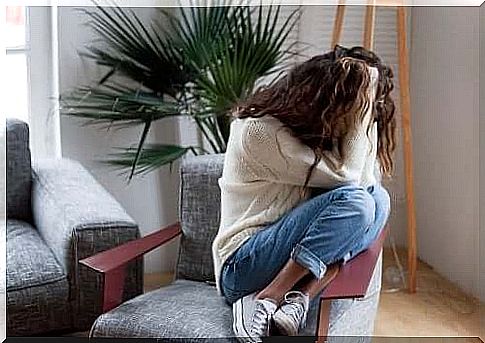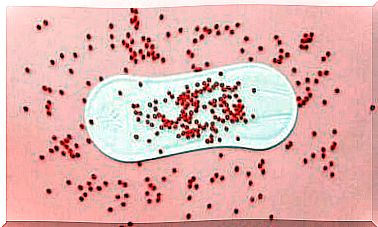Battered Woman Syndrome: How Can You Get Help?

Battered woman syndrome affects people who have experienced long-term physical or psychological violence in the past. This is a term coined by Lenore E.A. Walker in her book The Battered Woman Syndrome .
Her book covers all the physical symptoms and psychological consequences of abuse in a relationship. There is also a special chapter on situations involving children.
How do you identify battered woman syndrome?
Battered woman syndrome has distinct features that everyone should be able to identify. The reason for this is very simple. People who suffer from this should seek professional help as soon as possible.
The symptoms should not develop further, as they ultimately affect the victim’s quality of life. These symptoms include:
- Physical symptoms such as:
- insomnia
- weight loss
- somatization of emotions in the form of, among others, eczema and migraine.
- Psychological symptoms such as:
- depression
- low self-esteem
- feelings of guilt
- hopelessness
- fear
Battered woman syndrome can manifest itself in various physical and mental manifestations, such as:
- insomnia
- weight loss
- depression
These are just some of the symptoms a person with battered woman syndrome may have. However, there are many other things to consider on an individual level.
Let’s take a look at some of the possible consequences of this, and the steps to take to reduce the trauma.
Learned helplessness

This is a psychological state that often occurs in people who have once been abused by someone they have trusted for a long time. It is the harmful acceptance that prevents a person from making decisions for himself or herself.
- They do not stand up for themselves and come out or find themselves in a situation where they were violated or abused.
- These people believe that nothing they do will affect the outcome.
It may sound easy to overcome, but this is an extremely disabling situation. Therefore, learned helplessness is the main reason why many people are still in a situation of abuse.
In addition, not addressing this problem can make them easy to fall prey to another abuser again.
Post-traumatic stress
When a person has been exposed to a situation of repeated abuse for a long time, he or she is under constant stress. This long-term stress continues even after leaving the situation.
This fight-or-flight response, which is so important for animals to survive, is completely maladaptive in people with battered woman syndrome. Stress and anxiety can arise under circumstances that people need not fear at all.
To identify post-traumatic stress disorder, it is important to analyze the behavior of the abuse victim. Think about:
- nightmares and flashbacks leading to night sweats and anxiety.
- avoiding places, people, or thoughts that remind them of their abuse.
- excessive alertness, especially on the street, because they think their offender is following them.
- difficulty remembering specific moments of their traumatic events.
Almost everyone who goes through periods of violence has trouble overcoming flashbacks. Post-traumatic stress settles in the belief that their aggressor will be able to pull them back into the old abuse situation.
Getting Help for Battered Woman Syndrome

Even if a victim of abuse thinks that he or she cannot get help and will never get over it, this is not the case. Yes, it is true that in many cases abusers get away with a restraining order. Yes, it’s scary. And yes, you often have no control over it.
However, it is also true that it is entirely possible to take responsibility for your own life, distance yourself and heal from any kind of abuse or trauma. So let’s see what you can do about it.
Doctors, dentists, clergy, or your child’s school
These people all have a duty to report. They have all received training in matters related to domestic violence.
They should be able to help you get out of a domestic violence situation by contacting organizations that provide help.
Keep in mind that most of the information you give your doctor or clergy is confidential. These persons must also report child abuse.
Legal counsel
Lawyers specializing in family law often have connections to available resources that can help with domestic violence cases. They can also help you plan a safe exit from an abuser and help you obtain a court order or temporary restraining order.
If you don’t have the money for a lawyer, contact Victim Support to see if you qualify for free representation or advice. They can also be reached by telephone on 0900-0101.
Shelter
There are many organizations that are committed to helping people deal with domestic violence. In the Netherlands we have the national hotline for domestic violence, Safe at Home.
In addition, each region has its own hotline, which you can find on the internet. You can also contact us by telephone on 0800-2000. This number is toll-free and available 24 hours a day.
Therapy
Getting help from a therapist is one of the best and healthiest ways to help you heal and get your life back on track and moving forward.
Discuss the options with your doctor first. In many cases, therapy is reimbursed by your health insurance. Make sure you get the help you, and possibly your kids, deserve to move forward. That way you can lead a healthy life and also make sure that abuse is a thing of the past.
Emergencies
Most hotlines are organizations that you can call when you or someone else needs to talk to someone. It can be very important in those moments when someone is feeling depressed or even suicidal.
The police can help you with domestic violence by providing you with a safe place while they investigate your case. They also put you in touch with other resources such as food banks, employment offices and lawyers.
- If you find yourself in a situation of violence, do not hesitate to call 112.
- In case of acute depressive or suicidal thoughts, call the Suicide Helpline on 0900-0113.
No one should tolerate domestic violence and there are many ways to get out of it. So ask for help if you need it!









